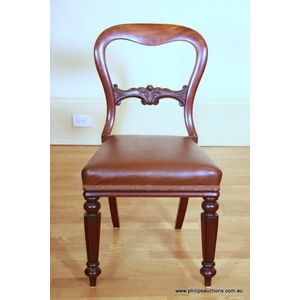Victorian Mahogany Dining Chair with Carved Cross-Rail
You must be a subscriber, and be logged in to view price and dealer details.
Subscribe Now to view actual auction price for this item
When you subscribe, you have the option of setting the currency in which to display prices to $Au, $US, $NZ or Stg.
- Victorian Period - The Victorian period of furniture and decorative arts design covers the reign of Queen Victoria from 1837 to 1901. There was not one dominant style of furniture in the Victorian period. Designers used and modified many historical styles such as Gothic, Tudor, Elizabethan, English Rococo, Neoclassical and others, although use of some styles, such as English Rococo and Gothic tended to dominate the furniture manufacture of the period.
The Victorian period was preceded by the Regency and William IV periods, and followed by the Edwardian period, named for Edward VII (1841 ? 1910) who was King of the United Kingdom and the British Dominions and Emperor of India for the brief period from 1901 until his death in 1910. - Mahogany - Mahogany is a dense, close grained red-coloured timber from the West Indies and Central America. It was first imported into Europe in the the early 18th century and its use continued through the 19th century. It was popular for furniture making because of its strength, the wide boards available, the distinctive grain on some boards, termed flame mahogany and the rich warm colour of the timber when it was polished.. The "flame" was produced where a limb grew out from the trunk of the tree, and this timber was usually sliced into veneers for feature panels on doors, backs and cornices.
Some terms used to describe mahogany relate to the country from which it originally came, such as "Cuban" mahogany, "Honduras" mahogany etc. However unless the wood has been tested the names assigned are more a selling feature, rather than a true indication of the timber's origin. - Turning - Any part of a piece of furniture that has been turned and shaped with chisels on a lathe. Turned sections include legs, columns, feet, finials, pedestals, stretchers, spindles etc. There have been many varieties and fashions over the centuries: baluster, melon, barley-sugar, bobbin, cotton-reel, rope-twist, and so on. Split turning implies a turned section that has been cut in half lengthwise and applied to a cabinet front as a false decorative support.
This item has been included into following indexes:
Visually similar items

A set of four Victorian rosewood dining chairs, 19th century, the waisted chairs with trefid crests and carved mid rails, with old gold velvet stuffover seats and raised on turned legs with long centurion skirt style decoration and toupie feet, height 84 c

A set of four Victorian mahogany balloon back chairs, 19th century, the waisted chairs with a foliate carved mid rail above a square stuffover seat, upholstered in deep maroon/brown leatherette and raised upon knopped and fluted baluster legs and toupie fe

Regency mahogany carver chair with inlaid solid top rail, pierced horizontal slat with brass roundel on ringed tapering legs

A set of eight early Victorian mahogany spade back chairs, circa 1840, the spade backs having simple threaded edges and conforming mid rails the square form stuffover seats covered with pink velvet above slender baluster reeded and turned tapering legs. He
